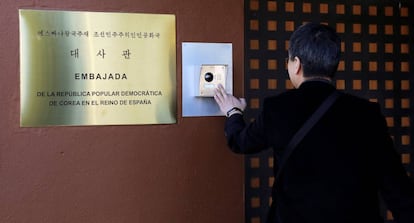“Political espionage” suspected in attack on North Korean embassy in Madrid
Investigators have approached the South Korean consulate as they investigate why a group of men broke into the diplomatic building and beat up staff inside


The North Korean embassy in Madrid is a large residence surrounded by pine trees, and located in Aravaca, a quiet residential area north of the capital.
According to sources close to embassy staff, only “a diplomat and one or two of their assistants and respective families” have lived at the embassy since former Spanish Interior Minister Alfonso Dastis expelled the North Korean ambassador Kim Hyok Chol from Spain on September 19, 2017.
Investigators believe the attack was carried out by professionals who “knew what they were looking for”
On February 22 at 3pm, 10 masked men carrying imitation weapons are alleged to have entered the embassy and beaten, handcuffed and interrogated the eight people inside. “They carried fake firearms and they held them for two hours,” said sources close to the investigation, who say that the attack appeared to be carried out by a “military cell.”
At 5pm, a Korean woman managed to escape through a window and alerted residents with her screams. The woman allegedly ran down the street to a nursing home and large luxury hotel, although no one from the hotel said they heard or saw anything.
Minutes later, a police car arrived at the scene but the officers were unable to understand the woman because she “had a head injury and was only speaking in Korean.” Thanks to a translating application on her phone she was able to tell the officers what had happened. According to the woman, the attackers were also Korean and had entered the embassy by scaling a wall the building shares with an empty property. Police officers tried to enter the embassy, but the man who opened the door told them everything was fine. In police chat groups, officers questioned the mental health of the Korean woman.
But the officers remained on the scene and saw a man enter the house. Shortly after, two luxury cars sped out of the garage, leaving the beaten captives inside. The men are also alleged to have stolen cellphones, computers and documents.
Personnel from Madrid’s SAMUR ambulance service arrived at the scene and tended to the injured, who had “bruises of varying degrees of seriousness caused by blows.” Hours later, police found the cars the assailants had used to escape. Both vehicles had diplomatic license plates and had been stolen from the North Korean embassy. They are currently being inspected by forensic teams.
Police are investigating whether the stolen computers may have contained important documents left behind by the former ambassador
Police have not ruled out any explanation. One theory is that the attack was related to “political espionage,” and officers have gone to the South Korean embassy to identify staff there.
The former North Korean ambassador to Spain, Kim Hyok Chol, was expelled in 2017 given that the nuclear testing that the country was carrying out at the time was in serious breach of United Nations Security Council resolutions. Kim Hyok Chol, who was declared persona non grata by Spain and was invited to leave the country, is currently one of Kim Jong-un’s highly trusted diplomats, and one of the architects of the recent failed nuclear summit between the North Korean president and US President Donald Trump in Vietnam.
Police are also investigating whether the stolen computers may have contained important documents left behind by the former ambassador.
Sources close to embassy staff say that the diplomats and their families live modestly in a “very Spartan place,” where there is little to be stolen. Investigators believe the attack was carried out by professionals who “knew what they were looking for.”
English version by Asia London Palomba.
Tu suscripción se está usando en otro dispositivo
¿Quieres añadir otro usuario a tu suscripción?
Si continúas leyendo en este dispositivo, no se podrá leer en el otro.
FlechaTu suscripción se está usando en otro dispositivo y solo puedes acceder a EL PAÍS desde un dispositivo a la vez.
Si quieres compartir tu cuenta, cambia tu suscripción a la modalidad Premium, así podrás añadir otro usuario. Cada uno accederá con su propia cuenta de email, lo que os permitirá personalizar vuestra experiencia en EL PAÍS.
¿Tienes una suscripción de empresa? Accede aquí para contratar más cuentas.
En el caso de no saber quién está usando tu cuenta, te recomendamos cambiar tu contraseña aquí.
Si decides continuar compartiendo tu cuenta, este mensaje se mostrará en tu dispositivo y en el de la otra persona que está usando tu cuenta de forma indefinida, afectando a tu experiencia de lectura. Puedes consultar aquí los términos y condiciones de la suscripción digital.








































